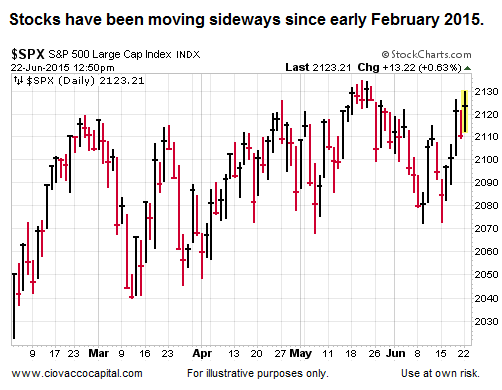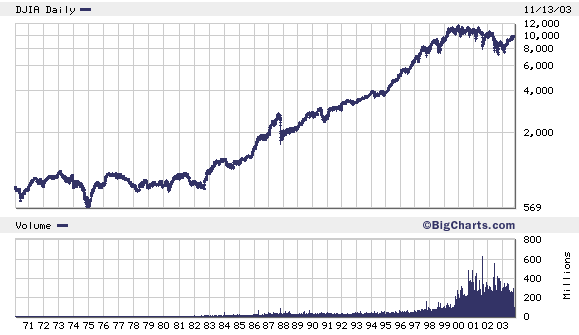What does bullish on the stock market mean
Being bullish simply means you have a positive sentiment and are optimistic about making money in a market or investment in the near- or long-term. The origin of the term is unclear, but it may have been solidified in a painting by William Holbrook Beard called "The Bulls and Bears in the Market," which is believed to depict the U.
Stock markets, like all markets, are driven by information and sentiment. Information gives you a logical basis on which to invest in a particular market, sector or company, but sentiment can also drive investment decisions made by humans, as opposed to computers.
If you are bullish on a market -- in other words, you have researched current economic conditions and believe that most of the market is going to rise -- you might buy an index mutual fund or index exchange traded fund. This would provide you with investments in a broad range of stocks, which offers the safety of diversification while allowing you to capture market-wide gains.
You may not be bullish on the entire market, but you might be bullish on a particular sector of the market, such as technology. As a trading strategy in this instance, you could purchase a basket of stocks in technology companies that you have researched and believe will produce gains going forward.
Another way to trade a bullish outlook on a particular sector would be, again, to buy shares in a sector fund or ETF. There are also sector rotation strategies you could employ, which generally favor certain sectors over others at different points in the business cycle.
If you're bullish on a particular company, it's important to research the stock before you put in a buy order.
What Does Bullish Mean in Stock Trading? - Budgeting Money
Bullishness can give you the courage to invest in a stock that might make you money, but you should always be careful not to let your positive bullish sentiment get ahead of you.
Invest with your head and not with your heart.

Plus you need to know that there are different types of stock analyses, such as fundamental, technical and quantitative. Most beginning investors tend to stick to fundamental analysis, which evaluates the basic elements of a company's financial statement and other data.
By looking at factors such as earnings per share, debt ratios and earnings growth forecasts, you can make a more informed decision about whether your bullish sentiment is based on an informed analysis, or runaway enthusiasm. The opposite of bullish is bearish. Bearish investors are pessimistic about the prospects of a market, sector or stock and will sell out of any bullish positions they may have had before their sentiment changed. There are also investors that are nicknamed perma-bulls and perma-bears, because their outlook doesn't change with the market.
Wayne Marks has more than 20 years of experience in finance, education, public relations and marketing in both New York City and Washington, D.
He has worked for corporate and nonprofit organizations and holds a certificate from the Wharton School of Business.

Each week, Zack's e-newsletter will address topics such as retirement, savings, loans, mortgages, tax and investment strategies, and more. At the center of everything we do forex usd eur historical data a strong commitment to independent research and sharing its profitable discoveries with investors.
What Does the Bull and the Bear Mean in the Stock Market? | Finance - Zacks
This dedication to giving investors a trading advantage led to the creation of our proven Zacks Rank stock-rating system. These returns cover a period from and were examined and attested by Baker Tilly, an independent accounting firm. Visit performance for information about the performance numbers displayed above. Skip to main content. What Does Bullish Mean in Stock Trading? More Articles What Is a Closing Order in the Stock Market?
What Does It Mean When the Market Is Oversold? How Do Stock Market Points Work? What Is a Hedge in the Stock Market? How to Invest in a What does bullish on the stock market mean Cap Stock Index.
Bullish on the Market Stock markets, like all markets, are driven by information and sentiment. Bullish on a Sector You may not be bullish on the entire market, but you might be bullish on a particular sector of the market, such as technology. Bullish on a Stock If you're bullish on a particular company, it's important to research the stock before you put in a buy order. Bearish The opposite of bullish is bearish. References 4 New-York Historical Society: The Bulls and Bears in the Market Index Funds: The Art and Science of Investing Seeking Alpha: Sector Rotation Strategies for Buy Stock Online for Beginner to Expert: Resources 1 The Motley Fool: How Peter Lynch Destroyed the Market.
Photo Credits toro image by osram from Fotolia. About the Author Wayne Marks has more than 20 years of experience in finance, education, public relations and marketing in both New York City and Washington, D.
How do I Create a Stock Portfolio for Paper Trading? Related Articles How Do I Buy a Single Stock? What Is OB on the Stock Market? Money Sense E-newsletter Each week, Zack's e-newsletter will address topics such as retirement, savings, loans, mortgages, tax and investment strategies, and more. Editor's Picks How a Company Establishes the Par Value of Stocks What Does the Bull and the Bear Mean in the Stock Market?
Short-Term Capital Gains in Real Estate What Are Demand Notes? How to Survive an Economic Crisis When the Stock Market Collapses. Trending Topics Latest Most Popular More Commentary. Quick Links Services Account Types Premium Services Zacks Rank Research Personal Finance Commentary Education.
Bullish Vs. Bearish - Series 4 | Investopedia
Resources Help About Zacks Disclosure Privacy Policy Performance Site Map. Client Support Contact Us Share Feedback Media Careers Affiliate Advertise. Follow Us Facebook Twitter Linkedin RSS You Tube. Zacks Research is Reported On: Logos for Yahoo, MSN, MarketWatch, Nasdaq, Forbes, Investors. Logo BBB Better Business Bureau. NYSE and AMEX data is at least 20 minutes delayed.
NASDAQ data is at least 15 minutes delayed.